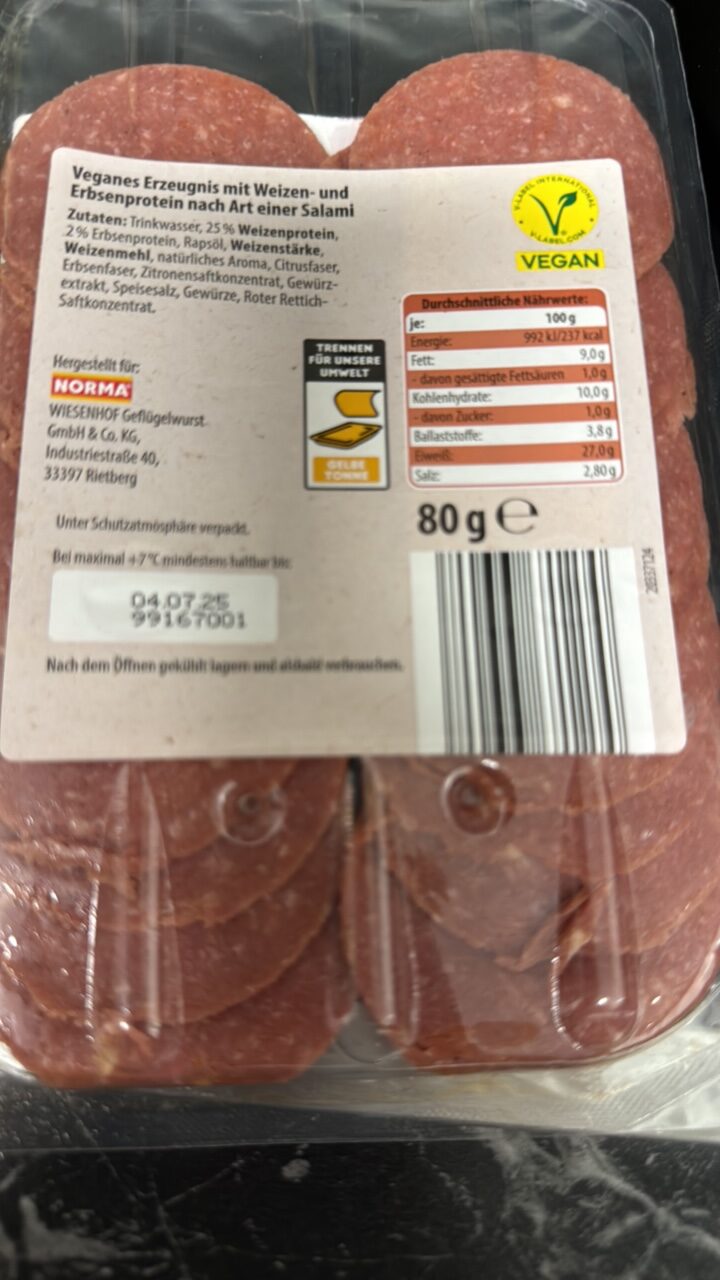
Barcode: 20337124
veganes erzeugnis mit weizen- und erbsenprotein nach art einer salami
HALAL
📝 Reason: The product is vegan and contains no explicitly Haram or meat-based ingredients. Most components are plant-derived and inherently Halal. However, ‘natürliches Aroma’ (natural flavor) is marked Doubtful (Status 2), as its source may be animal-based or contain alcohol unless Halal certified. This is per Islamic dietary law requiring purity and clarity of source (Qur’an 5:3, IFANCA, HalalHMC). For composite vegan products, any ambiguous ingredient must render the product Doubtful as per the rules.
🏷️ Category: Vegan Salami
📄 Certificates: Vegan, 80 G, Vegetarisch, Vegan
Ingredients:
Details
Understanding the Halal Status of Vegan Salami
Veganes erzeugnis mit weizen- und erbsenprotein, or vegan salami made from wheat and pea protein, is gaining popularity among those who prefer plant-based diets. This product has been certified Halal, which is crucial for many consumers who adhere to Islamic dietary laws. In this post, we will delve into the reasons for its Halal status, examine its ingredients in detail, and clarify any concerns regarding E-numbers and the integrity of each component.
Halal Certification Explained
Halal, meaning ‘permissible’ in Arabic, pertains to food that meets Islamic dietary laws as outlined in the Qur’an. The product’s Halal status is supported by its ingredients, most of which are derived from plants, inherently aligning with Halal guidelines. However, it is essential to confirm the sourcing of all components, particularly due to ambiguities surrounding natural flavors.
Ingredient Breakdown
The ingredient list for the vegan salami includes:
- Trinkwasser (Water): This ingredient is inherently Halal as long as it is pure and free from impurities.
Learn More - Weizenprotein (Wheat Protein): Derived from wheat, this protein is plant-based, making it Halal unless cross-contaminated with non-Halal substances.
Learn More - Erbsenprotein (Pea Protein): A widely accepted plant protein that is Halal and suitable for various diets.
Learn More - Rapsöl (Rapeseed Oil): This oil is Halal, originating from the plant source and is completely acceptable in Halal diets.
Learn More - Weizenstärke (Wheat Starch): As a plant product, wheat starch is Halal and safe for consumption in a Halal diet.
Learn More - Weizenmehl (Wheat Flour): A common ingredient that is always Halal, as it’s derived solely from plants.
Learn More - Natürliches Aroma (Natural Flavor): This ingredient could potentially be sourced from animal or non-Halal sources unless explicitly specified as Halal. This ambiguity marks it as Doubtful (Status 2).
Learn More - Citrusfaser (Citrus Fiber): Completely plant-based and thus Halal.
Learn More - Erbsenfaser (Pea Fiber): Another plant-based ingredient, confirming its Halal status.
Learn More - Zitronensaftkonzentrat (Lemon Juice Concentrate): Derived from lemons, this ingredient is Halal.
Learn More - Gewürz (Spices): Generally regarded as Halal unless specified otherwise, they add flavor without contamination concerns.
Learn More - Speisesalz (Cooking Salt): A mineral-based ingredient that is naturally Halal.
Learn More - Roter Rettichsaftkonzentrat (Red Radish Juice Concentrate): Completely plant-based, thus ensuring Halal status.
Learn More
Conclusion: Enjoying Halal Vegan Salami
Veganes erzeugnis mit weizen- und erbsenprotein is suitable for those seeking Halal-friendly, plant-based alternatives in their diet. The majority of its ingredients comply with Halal dietary regulations, making it a desirable choice for health-conscious and dietary-restricted individuals. However, it is important to remain cautious of the ‘natürliches Aroma’ ingredient, which lacks clarity regarding its source. Always check for Halal certifications from reliable sources and enjoy your Halal vegan salami with confidence!
